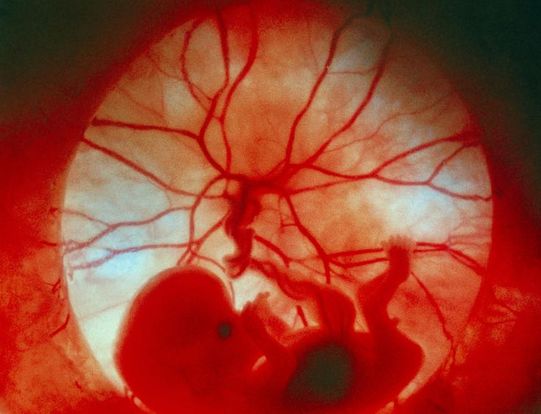13 weeks and 6 days pregnant

In this coloured ultrasound image the baby is red and the placenta green. It is just possible to see the two crosses that measure the depth of fluid in the nuchal fold at the back of the neck. Now is the last opportunity to measure this reliably.
Your baby is growing and getting stronger every day, and it’s all thanks to her life support system – the placenta.
Your baby’s rapid growth continues and her weight will increase during the next three weeks from 43g (1.5oz) to 140g (4.9oz). Muscle and bone growth advances, but, although all joints are present, it will be three weeks before the skeleton begins to harden.
Your baby is now totally dependent on the placenta for her nourishment. Environmental factors have almost no influence on your baby’s size at this stage; all babies up until around 20 weeks’ gestation are the same size.
The placenta is larger than your baby and supplies all the nutrients she needs. To aid her growth, the placenta extracts amino acids from your circulation, giving her high levels. Amino acids are the building blocks of protein, from which muscles and organs develop.

The umbilical cord can be seen connecting this 13-week-old fetus with the placenta, which nourishes your baby. The incredible blood vessels of the placenta are clearly visible in the background.
Protein is required for the development of the baby and placenta, as well as to fuel changes taking place in your body. The protein requirement for pregnancy is 60g (2oz) daily, instead of the usual 50g (1.8oz). Include a source in all three meals daily. Protein sources include meat, poultry, fish, milk, cheese, beans, nuts, and seeds.
The best protein foods are those that are lower in saturated fat and cholesterol. Trim the fat off meat and eat one or two servings of fish or seafood. When choosing dairy products, pick skimmed milk and low-fat cheeses. These retain all the protein benefits of the full-fat versions. Nuts and seeds are rich in heart-healthy oils. Vegetarians need to eat a wide range of plant proteins to ensure they are getting adequate amino acids.
Be the first to support
Be the first to share
Comment (0)
Related Blogs & Vlogs
No related events found.
Loading more...